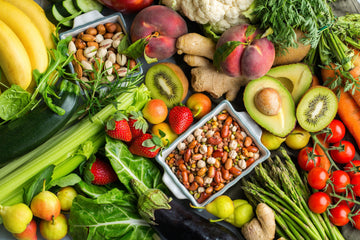In the world of nutrition, there are many approaches that aim to promote general well-being. One concept that has gained popularity in recent years is the alkaline diet. This diet aims to support the acid-base balance in the body by consuming predominantly alkaline-forming foods. Many people who follow this diet report positive changes in their everyday lives. But what is behind this diet and how can you integrate it into your everyday life? You can find out more in this article.
What does “alkaline diet” mean?
The alkaline diet is based on the principle that the body needs a balance between acids and bases. This balance - the pH - is crucial for various bodily functions. A normal blood pH is slightly alkaline (around 7.4). Some people believe that certain eating habits and a stressful lifestyle can cause the pH to shift. This is where the alkaline diet comes in: it is recommended to eat more alkaline-forming foods to promote a balanced diet.
How does the acid-base balance work?
The body has natural mechanisms to regulate acid-base balance, including breathing and kidney function. A balanced diet can support these processes and play an important role in general well-being. Many people find a varied diet with a high proportion of plant-based foods beneficial.
The best alkaline foods
Vegetables: Green vegetables such as spinach, kale, broccoli and cucumber are particularly nutrient-rich. They are rich in vitamins, minerals and antioxidants and can enrich a balanced diet.
Fruits: Fruits such as bananas, apples, melons and berries can also be a valuable part of a healthy diet. Lemons, although sour in taste, are considered positive in many diet plans.
Potatoes: Potatoes, especially sweet potatoes, provide fiber and can be integrated into the diet in many ways.
Nuts and seeds: Almonds, flax seeds and chia seeds provide healthy fats and proteins and can also be part of a balanced diet.
Legumes: Legumes such as lentils and beans provide vegetable protein and are versatile.
Water and herbal teas: Adequate fluid intake is essential for a healthy diet. Water and herbal teas provide a good basis.
Foods that should be consumed in moderation
Some foods can affect the acid-base balance and should be consumed in moderation:
• meat and sausage products
• dairy products
• white flour products
• Sugary foods
• alcohol and caffeine
Benefits of a balanced diet
Many people report that a balanced and varied diet with plenty of fruit and vegetables makes them feel more vital and improves their general well-being. This diet supports the body with important nutrients that play a positive role in everyday life.
How to integrate alkaline nutrition into your everyday life
Have an alkaline breakfast: A green smoothie made from spinach, cucumber and avocado or oatmeal with almonds and berries can be a nutritious option to start the day.
Include more vegetables in your meals: Vegetables should be included in every meal, whether as a side dish, in a salad or as a main course.
Don’t forget to drink water: Make sure you drink enough water or herbal teas throughout the day.
Enjoy acid-forming foods in moderation: It is not necessary to completely avoid certain foods, but a balanced ratio of alkaline-forming and acid-forming foods is recommended.
Conclusion: The journey to a balanced diet begins today
The alkaline diet offers a way to support overall wellbeing through the consumption of fresh, plant-based foods. Start adding more alkaline-forming foods to your diet today and see the positive changes this can have on your wellbeing.





